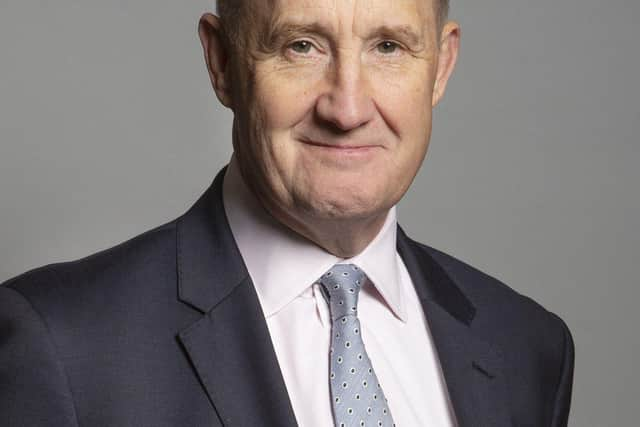New deal with banks could help vital rural post offices stay open: Kevin Hollinrake
There are currently over 6,000 rural branches, which constitute 54 per cent of the total post office network.
Over 3,000 of those rural branches are described as the last shop in the village. Recent research highlights how vital these branches are.
Advertisement
Hide AdAdvertisement
Hide AdThey enable people to access vital services without needing to drive or use public transport.


They are particularly cherished by older people and those who might struggle to travel far to access services.
In my constituency we have lots of bus passes but not many buses, so it is very important that those rural post offices exist, as they are also integral to businesses operating in rural areas because of their important role in providing access to cash.
Cash being the word, the Government have provided significant financial support to sustain the network nationally, adding up to more than £2.5 billion over the last 10 years.
Advertisement
Hide AdAdvertisement
Hide AdThe Government are providing a further £335 million for the Post Office for the period between 2022 and 2025.
As part of that support, the Government have committed to maintaining the annual £50 million subsidy to safeguard services in the uncommercial parts of the network until 2025.
The Government protect the sustainability of the branch network, and the rural network in particular, by providing funding on the basis that the Post Office meets its minimum access criteria, to ensure that across the country 99 per cent of the population live within three miles of their nearest post office.
The Post Office meets its access criteria obligations nationally, making it the largest retail network in the UK with an unrivalled reach, especially in rural areas.
Advertisement
Hide AdAdvertisement
Hide AdIndeed, in 2022 98 per cent of the rural population lived within three miles of their nearest branch.
The Government remain committed to the long-term sustainability of the Post Office, but we have to recognise that there is not a bottomless pit of money.
Of course, with a network of this size, we are likely to see a fluctuation in the number of branches that are open at any one time.
However, the network is certainly not in decline at a national level.
Advertisement
Hide AdAdvertisement
Hide AdAs its chief executive officer recently confirmed, the network is as large today as it has been for five years, with around 11,700 branches open.
There has been a diminution of hundreds of millions of pounds in revenue into the post office network because of the change in consumer habits, so we need to find ways to make the network sustainable in its own right.
The banking framework is a relationship between banks and post offices, in terms of how post offices are renumerated for providing many of the services banks used to provide when they had branch networks across the country.
Since 2015, there have been 5,500 bank closures—at the last count—across the network and collectively across the different high street brands.
Advertisement
Hide AdAdvertisement
Hide AdThat saves those banks somewhere in the region of £2.5 billion to £3 billion a year.
We are very keen for the Post Office, in its negotiations with the banks via UK Finance or other means of negotiation, to get a better deal and better remuneration from that relationship.
Increases in remuneration should go, wherever possible, into the branch network or into automation to make those branches work more efficiently, so that they can be more profitable.
A key thing that we would like to see is a fairer relationship, which shares some of the savings banks are making from the closing of their branches with the network that is providing those services since their closure.
Advertisement
Hide AdAdvertisement
Hide AdWhile we want to see access to post office services retained for our communities, we also want things like access to cash, both in terms of dispensing cash and cash deposits.
That is vital, particularly for small and medium-sized enterprises, and for the two million people in this country that do not have a bank account and the eight million people who use cash every single week.
We see post offices becoming parcel hubs, and the Post Office sees that as an opportunity to be frequented not just by custom from Royal Mail but also DHL, DPD, Amazon and other providers. There are future revenue opportunities that we should encourage to ensure that the network is sustainable.
There are certainly challenges ahead, but we continue to work with the Post Office to ensure that it is fit for the future.
Kevin Hollinrake is a business minister and MP for Thirsk and Malton. This is an edited version of a recent Westminster Hall speech.